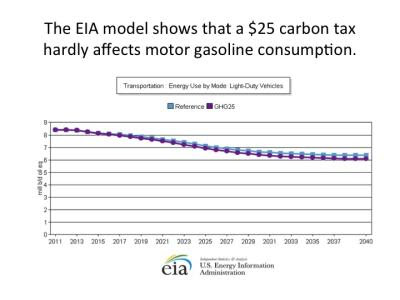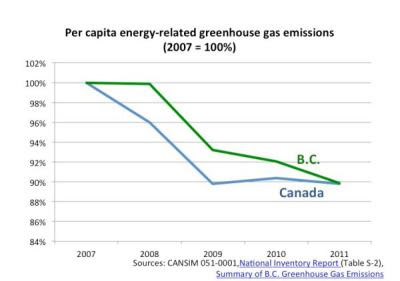If there’s one thing that economists agree on about carbon taxes it’s that there’s not much effect on consumption of transportation fuels. The explanation is that demand is very inelastic - driving is something that people 'have to do'. So price changes don’t have much impact on how much driving people do. For example, the NEMS model used by the Energy Information Administration predicts the impact on gasoline consumption of a carbon tax that starts at $25 per ton CO2 in 2015 and rises at 5 percent per year through 2040 should reduce consumption by something like 0.034 percent, a negligible amount.
At first glance this negligible effect seems to contradict the fact that greenhouse gas emissions [GHGs] from British Columbia had fallen 4.5% between 2007 and 2010 following imposition of its carbon tax. However, it is estimated by experts and the BC govt. that most of this decrease is, in fact, attributable to the economic recession. Rob Fleming, the B.C. NDP environment critic, said Mr. Lake’s confession was a bit odd. “The minister was candid, but basically admitting global, economic recessionary forces had more to do with B.C’s slight emissions drop than the sum total of the B.C. Liberal climate policy.”
Considering that transportation accounts for about 1/4 of national greenhouse gas emissions and about 1/8 of global greenhouse gas emissions. The global climate challenge is mostly about coal and electricity generation, not about petroleum or transportation fuels. Yet BC's carbon tax [CT] is regressive in both sectors because a carbon tax applied to industrial producers is simply added to the cost side of the ledger and passed on in the price, so the tax ends up being paid by the end of the line consumer in all cases. And though it may be paid equally [relative to consumption] the pain isn't equal, the rich wouldn't even notice, but the poor would have to adjust their other spending to accommodate the increase.
To add insult to injury, Christy Clark's Liberals have declared natural gas to be clean energy source [despite the fugitive methane it refuses to acknowledge, let alone measure] and if Clark’s ambitions of five LNG export terminals come on stream in that province, the oil and gas sector will rise to 52 per cent of Canada’s emissions by 2030 meaning the rest of the Canada's economy will have to reduce emissions by 54 per cent.
Though our leaders and media constantly drum GROWTH, GROWTH, GROWTH, the fact is that when human consumption slows, planet Earth can heal. Only when our obsession with consumption wanes, only when our economy - based on endless growth - is seen as the destroyer of life and real wealth that it is, will our planet be able to heal. Two interesting points in the graph below: 1.) The reduction in 2015's emissions may be partly due to better efficiency, renewable energy, and the like. But, mainly, it is the result of the global economic slowdown. 2.) Every time global emissions drop it's a result of an economic slowdown.
To conclude, CTs are designed to make politicians look good not cut GHG emissions by any meaningful amount. CTs can be progressive, but can also be regressive, as is BC's version. But there is an effective mechanism for reducing GHG emissions - degrowth.






